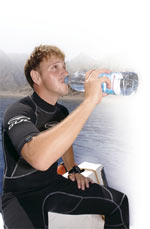
Hydration and nutrition
During a scuba diving, you can burn as much energy as you would playing an aerobic sport, such as squash or badminton. The precise amount will vary according to
your fitness, the temperature of the water, and any prevailing currents. But while it is tempting to stoke up on a big fried breakfast in preparation for a day’s diving, better food choices before a dive are complex carbohydrates, which will keep you feeling fuller for longer and provide a steady supply of blood sugar to maximize energy levels while you are diving. Some foods may make you feel uncomfortable on a dive—commonly, greasy or hot and spicy dishes—so these are best avoided. After a dive, you need to replace the energy you have burned with foods that release energy into your blood relatively quickly, such as refined carbohydrates. Have something to eat within an hour of surfacing, if possible. Energy-replacement drinks can be a quick fix, but avoid those with a high caffeine content.

Above all, the most important thing is to remain well hydrated before and after a dive. Your physical performance will be reduced if you become even mildly dehydrated, and this is a big issue if you are diving in warm waters where the outside temperature is also high. Aim to drink at least 2 quarts (liters) of water during the course of the day (more if it is hot). This will help to reduce muscle cramps and fatigue, and also helps decrease the risk of DCS.
Avoiding problems
It is important to get plenty of sleep before and after diving, to give your body a chance to recharge. Diving is physically demanding, and if you are run down, you are more susceptible to catching colds. If you do have a cough or a cold, you should not dive, because some symptoms of respiratory illness can prevent you from being able to equalize and may increase your vulnerability to DCS. Avoid taking decongestants, since these can impair your performance underwater.
Foods to eat when diving ( common diver’s diet )
The following list gives examples of the kinds of foods it is good to include in meals and snacks before and after a dive:
Before a dive Multigrain, whole-wheat, or rye bread; whole-wheat pasta; sweet potatoes; brown rice; oatmeal; branbased cereals; legumes and nuts; beans; leafy vegetables; and plain yogurt.

After a dive Pasta and rice (ideally in a salad or low-fat sauce); potatoes; fresh fruit; white bread or bagels.
after a dive
It’s tempting to head for the bar after a day’s diving, but have something to eat, too. Even standing still in cold water burns calories. So can alcoholic drinks, which are best avoided the night before a dive because they can also contribute to dehydration. Divers sometimes experience minor ear infections, especially after days of continuous diving or if diving in slightly polluted waters. There are various ways of avoiding ear problems, including rinsing the ears with fresh water after every dive, or using an alcohol-based fluid designed for swimmer’s ear. Lastly, you should have a regular dive medical to check that you are in good enough shape to dive. If, between medicals, there have been any changes in your health since you last dived, then it is always best to have a checkup.